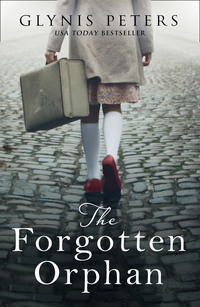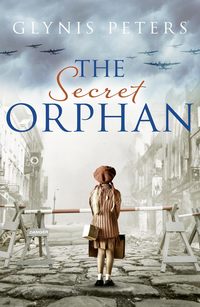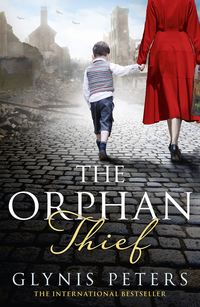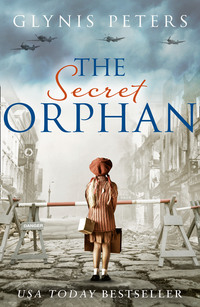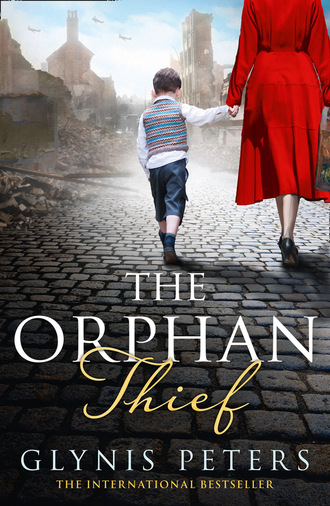
Полная версия
The Orphan Thief
CHAPTER 2
16th November 1940
A frozen Ruby stretched out her legs and rubbed them warm. Born with her left leg shorter than the right, she despised the limp and cramping of the muscles it gave her whenever she’d walked too far. Today she experienced severe pain, but knew sitting still would not relieve her aching limbs. She massaged them, pleading with her legs not to let her down.
A shiver ran through her as she heard a loud bang. They’d endured another long night of explosions from buildings and gas pipes, and it continued into the new day. Endless screams echoed across the city. The bombing was the cruellest thing anyone could have inflicted upon Coventry.
She felt dirty, unwashed, and needed food and drink. Crawling out from the small den, she made her way towards the public shelter. Bone-weary townsfolk sat propped outside its entrance. They stared at her, but she knew she was invisible to them. A nothing. Nobody’s daughter. She walked on, heading towards the warmth of the city, a fifteen-minute walk towards the heat of death and destruction. Rows of weary travellers passed her by, all fleeing the devastation for fear of more bombings. On more than one occasion she was encouraged to join friends of her parents and other families. She muttered about later, with no intention of leaving Coventry. For Ruby, despite not having one, this was home.
As she walked past a tumbled house, she spotted a blanket lying across a tangled fence. She glanced around but couldn’t see anyone, and tugged the blanket free. Draping it across her shoulders, she felt the weight of an honest parent bearing down on her. For the first time in her life, Ruby had taken something which didn’t belong to her. She’d not been given the blanket, nor had permission to remove it, but she’d gone ahead and done it with no repercussions other than a guilty mind. The freezing air away from the town deemed it necessary, as she fully intended to return to her den after she’d found food.
Picking her way down Little Park Street towards the centre of town, the sight of the burning cathedral in the distance took her fears to another level. It looked no more than a shattered piece of architecture. Splintered shards of brickwork refusing to cave in to a power mightier than itself, it stood defiant in the raging flames. She prayed it would survive. It was the beating heart of the city. The residents were proud of their cathedral and she watched as men battled to save its crumbling shell.
On the corner of Hertford Street, Ruby noticed a crowd praying and sobbing; most were women with children clinging around their legs or held tightly in their arms. To one side of the gathering she spotted a family whose children she knew from church, standing in an obvious queue near a makeshift building Ruby hadn’t seen before. They looked as bedraggled as she felt. She hesitated in her approach, and decided to join them for whatever they were queuing for, in the hope it was food.
‘Hello, Jenny,’ she said to a girl around her age but much shorter, making her appear younger.
‘Ruby, oh, Ruby,’ said Jenny, her voice soft, her left eye twitching. ‘Isn’t it awful? We lost our house. We’re waiting to be taken to my auntie’s at Warwick. We’ll sleep on her floor. Mum’s registering for new papers, and sending word to me dad we’re all safe.’
She sniffled and her mother pulled her close. A pang of envy stabbed at Ruby and she gripped her hands together to remain in control of her emotions.
‘Ruby, where’s your family?’ Jenny’s mother asked.
‘With my gran,’ Ruby replied. ‘Probably heaven.’ She didn’t want to shock the woman but couldn’t think of another way of wording her loss.
‘Oh, my girl, come here,’ Jenny’s mother said, and smothered Ruby in a hug. She smelled of smoke and soot, and clung onto her until Ruby gently pushed herself free. It was her mother’s comfort she yearned for, not a woman filled with pity and sadness.
‘Do you know where I can find food? Is this a queue for some?’ Ruby asked.
‘You need to register your family deaths and get papers for yourself. I assume all is lost?’
Ruby nodded.
‘Food can come later. Stand here – we’ve waited around an hour now, and no one will notice you’ve jumped in halfway,’ Jenny’s mother said.
‘It’s been a busy day,’ Ruby said, and inhaled to fight off another wave of nausea.
Jenny reached out to take her hand, but Ruby gave a brief shake of her head. She could no longer bear the pitying eyes looking back at her. They stirred something inside and Ruby was wary of whatever emotion it was creating the dark thoughts each time she allowed herself to soften to another human’s kindness. Her heart was bruised, battered beyond repair.
‘I feel sick and weak. I can’t focus on anything,’ she said, distracting her from the rejected look on Jenny’s face.
‘Ah, of course. Silly me,’ Jenny’s mother said. ‘Try over at one of the canteen vans. They’ve got tea and beef dripping batches. Be careful, Ruby, and don’t forget, you need to get registered. Find a new home. You’re too young to be alone.’
‘What happens when I’m registered?’ Ruby asked.
‘They might find you a new family. Someone will take you in. If not, you will at least be in the care of someone until a permanent home is found for you. You need a roof over your head. It might be away from here too – safe,’ Jenny’s mother said, and gave her another hug.
Ruby removed herself from the well-meaning arms and gave a brief nod. ‘I’ll sort it as soon as I’ve eaten. Thanks. Bye, take care, Jenny.’
Jenny gave a half-hearted wave and Ruby left the queue and walked to the area where Jenny’s mother had pointed.
Tea and a bread roll steeped in meat fat appealed far more than explaining her predicament to a form-filler at the beginning of a very long queue. Besides, she didn’t want a new family, or to leave Coventry. The thought of being sent to an orphanage frightened her, and if she left the area she’d lose the sense of her family still surrounding her. And what if they’d survived and were looking for her? She needed to stay, to keep her eyes open for them. Registering might mean living miles away and the thought made Ruby shudder.
The best thing she felt she could do was to slip into the background during the confusion of the city, and find a way of surviving without leaving town. Her dream had always been to have an adventure of sorts and, although this was a tragedy forced upon her, Ruby sensed it was time for her to make her own way in the world.
She kicked a battered box away from her path. Life was going to become difficult for her, and she had already turned her mind to the important issue of obtaining food. She needed money. Maybe she could work off her purchases by washing up. It was worth an ask.
Entering an area set aside for food distribution, Ruby looked on in dismay. Queue after queue faced her, and all were longer than the previous one she’d stood in. At the pace they were moving, it would be well into the night, even the early hours before she would eat. She shifted from one foot to another, debating what to do. It frustrated her, knowing their shop had housed tins and packets of foodstuffs, along with fresh grown vegetables supplied by growers from nearby towns. Her energy was sapped, but Ruby thought about her gran’s house. Although it was no longer standing, her gran had always kept a good vegetable patch. Maybe there were a few veg or fruit items left amongst the ruins and, though sad at the thought of returning to the bomb site, Ruby knew she stood a chance of finding something to eat without having to beg elsewhere.
‘Oi. Where’s your mask, girl?’ a man’s voice bellowed out a few feet away from Ruby. She knew his question was directed at her, as she had no mask to carry. Not wanting to suffer explaining her losses, she turned and saw a man in police uniform. She waved a hand vaguely in the direction ahead of her.
‘I’m heading back home for it now,’ she called out.
‘Make sure you do. And your ID papers. Keep them to hand too,’ the officer said.
Ruby rushed away. ID papers, ration book, birth certificate – anything official, her mother kept in a case under the stairs. With the flames flickering within the crater, Ruby doubted the case would have survived and realised she had nothing to show she even existed. Registering would be an impossible task and she was too tired and fearful to face more impossible tasks.
She entered Kirby Road and made her way to the small row of houses still standing. Each remaining property stood with glassless windows and shredded curtains flapping in the chill wind. The majority of the contents of one house lay strewn along its pathway, and the path she walked crunched beneath her feet. The road had a silent eeriness to it, and there was no one around. Ruby, puzzled by the fact, called out, ‘Hello. Anyone here?’
Silence. The only noises from the street she stood in echoed across the flattened right-hand side, but human movement and voices no longer existed. Ruby shook off the air of loneliness; she could not afford to dwell on it for fear of breaking down. She gulped as she walked over what had once been a happy house filled with love and baked cakes. Her grandmother cured many a tear with a slice of Victoria sponge and a strong cup of tea. Her beloved gran, lying cold in the temporary morgue. Ruby’s throat tightened against the scream she wanted to release, but she needed to focus on regaining her strength. Her legs and hands trembled with hunger and cold.
She scouted around her grandmother’s land, but soon came to realise that all was lost. Mangled blackout curtains were a stark reminder of hours spent in the house helping her grandmother with her mother, preparing the windows for war. Only the memory of evenings spent with the two women she loved made Ruby appreciate it had not been wasted time.
She spotted a few personal items, untouched by the bombs, and for the first time a smile flickered across Ruby’s face. The items were random ones, but they’d belonged to her family. They were the only connection to them she had left: heirlooms. A colander, a blue glass powder pot with no lid, two silver forks, a bowl with pink rose patterns around the edge and a tortoiseshell hair comb. It was one her grandmother used to pin into her thinning grey bun.
Ruby also found coins amounting to one shilling, which she placed into the blue pot. Twelve pennies would get her milk and possibly an egg or two if available, but it would certainly not help her clothing or accommodation situation. She decided she’d return and search for more once she’d found somewhere to live. The chances were her gran’s electricity meter had burst during the explosion. No one would be collecting their payment for supply. The coins were family money; it wouldn’t be theft.
Ruby crossed the road and walked up to Fred’s and wondered how he was doing after seeing him so badly shaken. At least he was alive and in the care of someone; the woman she’d seen leading him away yesterday had looked kind and gentle.
Although she knew he was not home, she still knocked on the door. She called hello through the blown-out front window, but there was no response. She did the same to five other houses in the row. All residents were elsewhere. Ruby headed back to Fred’s house, which sat at the end of the terrace, and went around to the back garden. She doubted he’d begrudge her any foodstuffs, and she’d pay him back when she was able. Only a small patch of turned over soil laid untouched by debris. She peered through the broken back window and door and then, taking a deep breath, Ruby stepped inside. Now she added trespassing to her sins. A shiver passed through her body as she stared around the home. How scared Fred must have felt. Shelves swung downwards, their contents on the tiled floor. The house appeared worse inside than from outside, and Ruby pondered the safety of the walls. She took another look at the exterior and, aside from one or two roof tiles missing, the brickwork seemed sound. She listened. No hissing sounds unnerved her – no gas pipes releasing their explosive poison.
Ruby spotted a photo frame lying face down and lifted it away from a pail of dirty water. She rubbed away the grime on the glass, and a young couple from an era long gone smiled back at her. The petite young woman in the picture held a small bunch of flowers. A bride and groom, standing in the kitchen where she now stood. This house had been a home of longstanding to Fred and Elsie Lester. Life and age had taken Fred’s wife before Ruby was born, but the enemy had destroyed their home – all he had left of the life they’d shared – and anger built inside Ruby’s chest to the point of exploding into screams, and she feared once she started she’d never stop.
She’d witnessed a woman’s face twisted with grief, receiving a resounding slap for hysteria, and another bellowing out a sound so guttural and raw Ruby knew the woman had lost her mind. She’d seen a man beat the crumbling wall of a house, his screams as high-pitched as any female. Their pain had been so deep they’d never recover, and Ruby closed a door in her heart to prevent the same happening to her. She locked in memories and her own deep pain so tight; each time she sensed an inkling of it breaking free she suppressed the feeling and replaced it with another. Now was the time for survival. She had little doubt the tears would find her further down the years, but for now she needed to focus on the positive side of things.
She made a decision there and then. Although she wasn’t close to Fred, he’d been a friend of her gran’s and he was alive. He deserved a home to come back to, and Ruby vowed she’d work and clear the old man’s home in readiness for his return. He looked as if he’d suffered a broken arm when she’d seen him being led away, so she had no doubt, once fit, he’d want to come home. She’d repair as much as possible, as payment for her rent whilst she stayed there. Fred’s home would survive, where hers hadn’t.
Before she got started, Ruby spent time looking for anything edible. Her hands trembled with hunger, and nausea came in waves. A knob of bread and a thin slice of cheese with a sprinkle of grit sat on the side. A supper untouched; he’d probably prepared it before the siren sounded. She cleaned away as much as she could of the grit and dust, ate it without noticing flavour or added soot, and washed it down with the remains of water left in the kettle. Mains water appeared to be cut off, as did the electricity and gas. After finding a small torch, she set it to one side for the evening. Dragging a mattress still with a bottom sheet wrapped around it, and which she noticed matched Fred’s sling, Ruby made herself a makeshift bed in a corner of the kitchen and then started her cleaning mission with fierce determination. A strange smoke-filled sky made everywhere warmer and darker than normal, and Ruby worked in a dream-like state.
Four hours into clearing broken items into one side of the garden, the light disappeared. She dragged a blown-off door from the left of the property, unsure if it belonged to the old man’s house or the neighbour’s, but it was too useful to be left to rot. She propped it across the window from the outside and hoped it would help block some of the cool wind building into freezing air. She’d placed the torch in the lower part of the room, finding its shadow and glow a comfort. Grateful for the two greatcoats she found hanging on the back of a door hanging by one hinge, she pulled one of them on. It wasn’t too large around the body, nor too long. The second she placed on the bed. No longer hungry, just exhausted, Ruby climbed onto the bed and gave in to sleep.
CHAPTER 3
17th November 1940
‘Next.’
Boom!
‘Next.’
Crash!
Ruby, startled awake by loud male voices and explosions too close for comfort, rubbed her eyes and scrambled from her bed. She tried to peer from a smashed window to the front of the house, but saw nothing. She picked her way outside, but again saw nothing. Only distant noises filled the air and, satisfied it was a dream which had woken her, she gave in to nature as it begged her to heed its call. She snatched up a bucket from the yard and took it inside. Once relieved, she emptied the contents in the back far corner of the garden and covered it with soil. As she walked back through the garden, she spotted movement a few doors down, then came another explosion and, to her horror, the building collapsed to the ground. Ruby stood stock-still, her heart catching in her throat. She wanted to run or crouch, but her legs wouldn’t move.
Was the enemy bombing nearby? The thought threaded fear throughout her body. She tried to take a step.
Boom. Crash.
They were getting closer and, if captured, Ruby dared not to imagine the consequences.
She weighed up the time left for her to gather up Fred’s personal effects and leave before they reached the end of the row. She used the blanket she’d found and pulled several items into it, including two tins of Spam and a cabbage from the garden. She tied it with a length of rope, hoisted it onto her hip and moved to the front of the building.
‘Halt!’
Without waiting to find out if the instruction was for her or the men in uniform she’d spotted near a truck at the front of the property, Ruby moved quickly, her mind settling on the best place to hide. She’d return to Radford Common. Escaping the enemy was a priority. She’d heard the adults discuss what would happen to young women if captured. Whispers of rape and abuse amongst the parishioners of their local church one Sunday remained with her. More than once she’d heard her mother whisper her fears for Ruby to a customer or two. The dread of those overheard conversations spurred Ruby on now, her legs bruised with the baggage she carried. Her hip, sore from the metal saucepans and precious colander, hindered the speed she travelled, but she was determined not to stop.
Once satisfied she had enough distance between her and the explosions, she looked about for someone to report the presence of the enemy, but all she saw were miles of shell-shocked people leaving the city.
Her weighty load forced her to stop halfway, and she took in her surroundings. Bombed car factories. Bewildered people. Smells which made her gag, some which made her mouth water; whichever way she turned there was something new to scare her, amaze her or turn her stomach.
Across the road, she heard another team of men shouting instructions to one another. They were clearing the building they stood next to and, as the bricks tumbled to the floor, Ruby felt a bubble of hysterical laughter brew inside her belly. Sudden realisation released the pent-up fear she carried. The men she’d fled weren’t the enemy; they were British soldiers and workmen clearing the unsafe buildings. A sadness hit her hard and the pending hysterical laugher was soon suppressed. With the men clearing unsafe properties, it meant Fred’s house would match that of her grandmother’s, and Ruby recognised the fact she’d been rendered homeless once more. There was no turning back, and she made a decision to find the den she’d slept in after the bombing and trudged on towards the greensward.
Along the way she spotted many useful items flung far and wide from destroyed properties, and Ruby debated whether to collect some before dark fell; she also pondered whether it would be stealing from the dead – something she’d never dream of doing during peacetime.
Another gnawing bout of hunger reminded her of other important issues and she sat, thinking about her future. As the daughter of a greengrocer, she’d never had to consider purchasing food. Her mother was a good seamstress, and clothing had never been short for the family either. Circumstances for Ruby had not simply changed, they’d become life-altering. She needed paper and pencil to make a list of items required. For a faltering moment she considered registering herself homeless – family-less – an orphan. Orphan. A word she refused to recognise. She still had parents; they simply watched over her, not in the flesh but in her mind.
‘Did you see the King yesterday?’ Two women stood chatting nearby and they gave Ruby a fleeting glance as she crawled out from under the hedge.
‘He cried. Cried for us,’ one woman said.
Ruby brushed herself down and walked away. A crying King? Never. Some people exaggerated their stories. King George was a strong man, the head of the country. He’d never cry in the street in front of strangers.
A twist of disappointment niggled at her failure to have seen their sovereign visit the city, until Ruby decided he’d have nothing but words to offer her.
Everywhere she looked, queues zigzagged their way from one building to another. White, grey, soot-black and puce faces of worn-out Coventarians, who barely moved. The world worked around them. A loneliness sat heavy on her shoulders and she dropped to her knees, weakened by the senseless crime committed against her and her family – her city – and Ruby remained on the floor, organising her mind, her warrior instinct weakened by a heart-breaking sadness. She fought the idea of ending her own life, of leaving town to gain a better one, of joining others for nothing but company, but she couldn’t bear the thought of people pitying her, and talking about her family no longer being alive. She tussled with so many emotions on the cold ground until she accepted she needed help, and resigned herself to registering herself in need. Uniformed men and women busied about the devastated areas. No one acknowledged her; she wasn’t an unusual sight. Ruby had witnessed many like herself, tired, uninjured and in mourning. An everyday event for a city torn to shreds. Time and energy were spent upon retrieving and repairing. There was no time for pity.
Rising to her feet, Ruby recalled her father’s best friend, Stephen Peabody. He’d definitely help her, and he lived nearby. She needed to tell him he’d lost his friend.
It saddened her to see history brought to its knees. The sight of the cathedral, now a shadow of itself, and trams twisted as if crumpled paper, protruding at all angles, upset her and as she clambered over the dark beams of what had once been a beautiful mediaeval street Ruby gritted her teeth and fought back, yet again, the nagging temptation of giving up the fight. It all seemed so pointless.
Upon reaching a building tucked away in Spon Street, she noticed the sign above the front window, S Peabody, Accountant, swinging on one nail. She peered through a small, intact pane of glass, amazed the building had escaped ruination by the bombs. Inside, a man bent over a desk; his head leaned on the surface, supported by his brow. A sleeping Stephen Peabody at his desk was not an uncommon sight. He often worked into the late hours.
Ruby tapped on the window. He didn’t move, so she banged harder. Nothing. Walking around the side of the property, she turned the handle of the outer door and it opened. She let herself inside and rushed to his side. His hands were blue-grey and as she touched his cheek she felt there was no warmth, no breath moving his chest. She sighed. Dead. Her father’s friend, a man who had visited their home on many occasions, had joined the list of Coventry’s dead. Would this nightmare never end?
Ruby contemplated her responsibility towards Stephen. He was an unmarried man and, as far as she was aware, his last living relative was a sister he’d argued with when their parents had died, and who now lived in Scotland. Pulling the curtains closed, Ruby slipped out of the door and made her way back to the main hub of activity. She found a man in uniform, clearing rubble near the cathedral. He looked familiar, possibly one of her parents’ acquaintances from church. Ruby explained her discovery and the man laid down his shovel and followed her.
‘Yes, girl, he’s gone. Looks as if his heart gave out; I can’t see any injuries. You did right, coming to find someone. Is he a relation?’
Ruby hesitated, unsure of how to describe Stephen. ‘My dad’s best friend. Dad’s gone too.’


